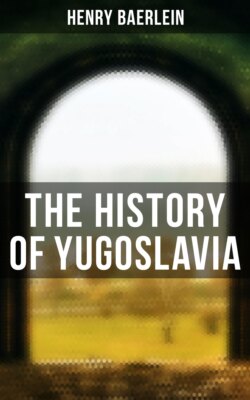Читать книгу The History of Yugoslavia - Henry Baerlein - Страница 86
На сайте Литреса книга снята с продажи.
THE SOUTHERN SLAV HOPES ARE CENTRED ON CETINJE
ОглавлениеWhile Tommaseo foresaw this union, his contemporaries of the Omladina strove for another one. Prince Michael Obrenović had, in 1860, again succeeded his father, and as it was not known if he had undergone a change in exile, the young patriots of the Omladina did not look upon him as the saviour of the Serbian people. There was again a poet on the throne of Montenegro, a youth of whom they heard romantic things. Not only had Prince Nicholas borne arms against the Turk, but he had sung in moving verse the glory of the Serbian heritage, the triumphant union of the Serbs that was to be. Since 1860 he had guided Montenegro's destinies—his uncle, the first purely temporal ruler, Danilo, having been assassinated in the Bocche di Cattaro after a reign of warfare against the Turk, and his own subjects, who resented the deposition of the tribal chiefs, the imposition of terrific taxes, based on the number of cattle they possessed, and occasional seduction of their wives. The Omladina knew that Michael had been visiting the West, that he had frequented the masters of science and politics in London, Paris and Berlin; but he would probably forget their precepts and in any case he was much duller than the splendid youth whom they affectionately called Nikita. … Some historians have wondered why this young man did not alienate the affection of his people by the slaughter of the Kadić clan, whereof a member had assassinated Prince Danilo. But it was the Senate which punished the murderer by exiling him, with seven families of his kindred, to Turkey. Danilo had been aware of his intention, while the man was waiting—in obedience to Austria's orders—at Kotor. And the Prince, acting on a local custom, sent word that if Kadić did not return to Montenegro he would bestow Mrs. Kadić on some one else. After two weeks she became the wife of a neighbour. The story that Kadić was avenging her seduction is an Austrian invention, for Danilo seems never to have met her.
One day in 1862 the Turks, who still were in the Belgrade fortress, started, for some foolish reason, to bombard the town. Prince Michael in the subsequent negotiations showed that he had qualities one could not but respect. Still he was unsuccessful (until 1867) in obtaining the removal of the Turkish garrisons—Great Britain, fearing Russian influence, and Austria, hostile to the total independence of the Serbs, supported Turkey. And Michael governed with so firm a hand that there were many who believed that the material improvement he was introducing, schools of agriculture, schools of forestry and what not, could be just as well inaugurated by the far more sympathetic Prince Nikita. And when in 1866 Michael and Nikita made a grand convention for the union of the Serbs in Serbia and in Montenegro, and Nikita undertook to step aside, if necessary, so that all the independent Serbs might be united under Michael's sceptre, then indeed the Omladina talked of him with rapture. And Nikita made allusions to this "grand refusal" all his life and with a face of honest pride. He never mentioned anything about clause 3, which was not published. By that clause Nikita was to be Prince Michael's heir, in case he had no son. There was not much likelihood that he would have one, for the Hungarian wife from whom he was divorced[46] had given him no children, and the girl with whom he was overpoweringly in love was a cousin, whom the Church, because of their relationship, prevented him from marrying. It was with this girl that the Prince was always said to have been walking in the park near Belgrade on June 10, 1868, when he was mysteriously murdered.[47] After Michael's death the Skupština, not acting in accordance with the secret clause, placed on the throne a grandson (?) of a brother of Prince Miloš, who was a minor and the nearest in the order of succession. By this time the Omladina had perceived that in the character of their romantic prince lay certain lamentable traits. The friendship, which he had inherited, with Russia he continued, and the Russian Court rewarded him in no half-hearted fashion. When the Italians proposed in 1866 that he and they should share the Bocche di Cattaro, he said the moment was not opportune; the Austrians for this bestowed on him a pension which they paid until the outbreak of the World War. One could understand, of course, that Nikita did not wish to rouse the enmity of Austria; it must have hurt him to refrain from going to the Bocche, where the population was most Slav and had endured a great deal for the cause, but other men were hurt by his acceptance of the pension.
